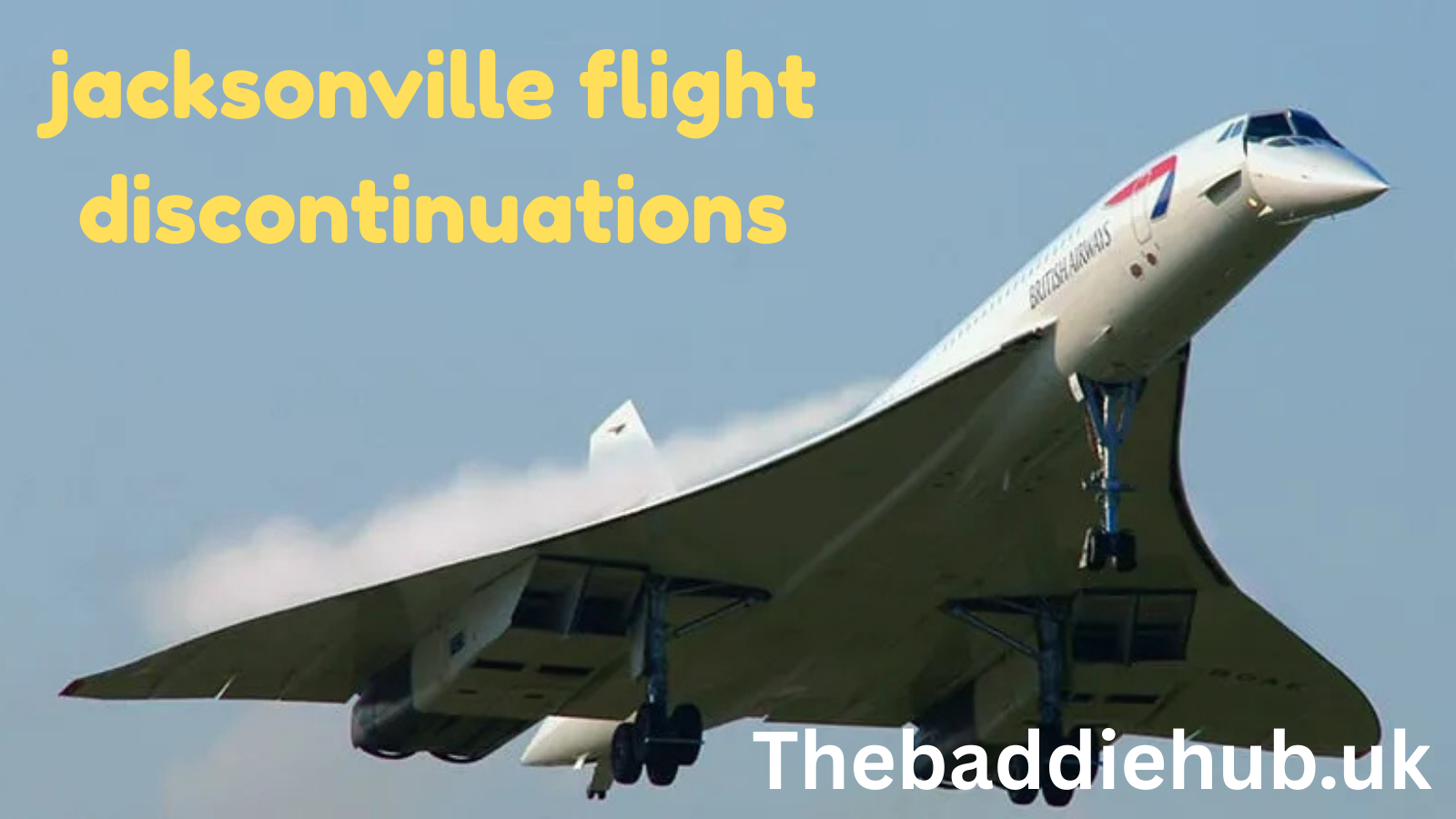Jacksonville Flight Discontinuations: The Reasons Behind Discontinuations
Air travel is often seen as the backbone of economic growth, tourism, and regional connectivity. Jacksonville, Florida—a city known for its vibrant culture, growing economy, and strategic coastal location—relies heavily on air transportation to connect businesses and residents to the rest of the country. However, recent flight discontinuations in Jacksonville have raised concerns among travelers, airlines, and policymakers alike. The reduction of available routes not only affects convenience for passengers but also has significant ripple effects on the region’s economy, tourism sector, and future development prospects.
This article takes an in-depth look at the issue of Jacksonville flight discontinuations—examining why flights are being cut, how airlines make such decisions, the implications for businesses and passengers, and what the future might hold for Jacksonville International Airport (JAX).
1. Understanding Flight Discontinuations in Jacksonville
Flight discontinuation refers to the permanent or long-term suspension of airline routes to or from a specific airport. Unlike seasonal changes or temporary suspensions due to weather or maintenance, discontinuations typically signal deeper issues related to profitability, demand, or strategic airline adjustments.
At Jacksonville International Airport, several carriers have scaled back operations, eliminating both domestic and international routes. While JAX remains a busy airport in Northeast Florida, the loss of certain connections to major hubs and smaller markets has become a noticeable trend.
Key examples of recent discontinuations include:
- Reduction in direct flights to Midwest and West Coast hubs.
- Suspension of certain low-cost airline services that once offered affordable connections.
- Cutbacks in international flights, limiting global access for business and leisure travelers.
2. Historical Context: Air Travel in Jacksonville
To fully understand the issue, it’s important to look at Jacksonville’s aviation history.
- Early Years: Jacksonville International Airport opened in 1968, replacing Imeson Airport. From its inception, it was intended to serve as a modern hub for Northeast Florida.
- Growth in the 1980s and 1990s: Several legacy carriers, including Delta, American, and United, expanded operations. Jacksonville was increasingly connected to major business hubs like Atlanta, Dallas, and Chicago.
- The Rise of Low-Cost Carriers: In the 2000s, Southwest Airlines, JetBlue, and Allegiant brought affordable flights, boosting tourism and making air travel accessible to more residents.
- Recent Declines: Over the past decade, economic downturns, airline mergers, and shifts in demand have gradually reduced Jacksonville’s route map. While passenger traffic continues to grow overall, the diversity of available destinations has narrowed.
3. Key Reasons Behind Jacksonville Flight Discontinuations
Airline route decisions are rarely arbitrary. They are influenced by multiple economic, logistical, and strategic considerations. For Jacksonville, some of the most prominent reasons include:
3.1 Demand and Profitability
- Airlines prioritize routes with high passenger demand. If flights from Jacksonville to certain cities consistently operate with low occupancy, airlines may cut them.
- Profit margins are often slim in the airline industry. Even a small decline in ticket sales can make a route unviable.
3.2 Competition with Nearby Airports
- Jacksonville competes with other major Florida airports, including Orlando (MCO), Tampa (TPA), and Miami (MIA).
- Many international travelers prefer Orlando for its theme parks and global connections, which can divert potential passengers from JAX.
- Low-cost carriers often concentrate on larger hubs, leaving Jacksonville with fewer budget-friendly routes.
3.3 Airline Consolidation and Strategy
- Mergers among airlines, such as American with US Airways or United with Continental, have led to restructuring. Airlines streamline operations by focusing on larger hubs.
- Jacksonville, while important regionally, may not fit neatly into the network strategy of larger airlines.
3.4 Pilot Shortages and Staffing Issues
- The global shortage of qualified pilots has forced airlines to prioritize their most profitable routes.
- Secondary airports like Jacksonville often see reductions when airlines must make tough allocation decisions.
3.5 Rising Fuel and Operating Costs
- Florida’s geographical location means longer flight times to the Midwest and West Coast compared to cities like Atlanta.
- Higher fuel consumption on these routes sometimes makes them less appealing to airlines operating on tight margins.
3.6 The COVID-19 Pandemic’s Lingering Effects
- The pandemic reshaped travel patterns, reducing business travel significantly.
- Although leisure travel rebounded, certain routes that once thrived on corporate demand have not recovered.
4. The Impact of Flight Discontinuations on Jacksonville
4.1 Passenger Inconvenience
- Fewer direct flights mean travelers must rely on connections through larger hubs.
- Increased layovers lead to longer travel times, reducing the appeal of Jacksonville as a convenient origin or destination.
4.2 Business and Economic Impact
- Jacksonville’s growing sectors—such as finance, healthcare, and logistics—depend on quick connections to other markets.
- Losing direct access to hubs like Chicago or Dallas can make it harder for local companies to attract partners and investors.
- Reduced air connectivity can also deter new businesses from relocating to Jacksonville.
4.3 Tourism Industry Challenges
- Tourism is a major driver for Florida’s economy. Discontinuations limit Jacksonville’s ability to attract visitors who prefer nonstop flights.
- Events, conventions, and sporting activities may also suffer from reduced accessibility.
4.4 Airport Revenue Declines
- Airports rely heavily on airline fees, concessions, and parking revenue.
- Fewer flights translate into reduced passenger numbers, which impacts JAX’s bottom line and ability to invest in future infrastructure.
5. Comparing Jacksonville to Other Florida Airports
Jacksonville’s situation must also be understood within the broader Florida aviation landscape.
- Orlando International Airport (MCO): As Florida’s busiest airport, it offers extensive international connections and attracts both tourists and airlines.
- Tampa International Airport (TPA): Known for its efficient design and growing route network, Tampa continues to attract new carriers.
- Miami International Airport (MIA): Serves as a major international hub, especially for flights to Latin America.
- Jacksonville (JAX): While modern and efficient, it simply does not have the same demand levels as its southern counterparts.
This competition makes it harder for Jacksonville to sustain a wide range of direct flights.
6. Passenger Adaptation and Alternatives
Jacksonville travelers are finding ways to adapt to the reduced flight options:
- Driving to Nearby Airports: Many residents drive to Orlando, Tampa, or even Atlanta to access more flights.
- Relying on Hub Connections: Travelers accept layovers in cities like Atlanta (Delta), Charlotte (American), or Houston (United).
- Using Low-Cost Carriers Strategically: Airlines like Allegiant still offer affordable flights to select destinations, albeit seasonally.
7. Potential Solutions and Recovery Strategies
7.1 Airport Incentives
Jacksonville International Airport could offer incentives to airlines, such as reduced landing fees or marketing support, to encourage new routes.
7.2 Government and Business Collaboration
Local government and business leaders can partner with airlines to demonstrate demand for specific routes. Economic incentives may also help attract carriers.
7.3 Focus on Niche Markets
Instead of competing directly with Orlando or Miami, JAX could position itself as a regional hub for underserved destinations.
7.4 Enhancing Tourism Marketing
Promoting Jacksonville as a unique tourist destination could increase leisure travel demand, encouraging airlines to restore routes.
7.5 Airline Partnerships
Developing codeshare agreements and airline partnerships could indirectly expand JAX’s network without requiring nonstop service.
8. Future Outlook for Jacksonville Air Travel
While jacksonville flight discontinuations present significant challenges, Jacksonville is not without hope. Several trends suggest possible recovery:
- Post-Pandemic Recovery: As business travel slowly rebounds, airlines may reconsider previously cut routes.
- Regional Growth: Jacksonville’s population is steadily increasing, which may lead to greater demand for flights.
- Low-Cost Carrier Expansion: Budget airlines often experiment with mid-sized markets like Jacksonville, which could bring new routes.
- Global Travel Trends: Increased demand for domestic leisure travel could help Jacksonville position itself as an affordable entry point to Florida.
9. Lessons from Other Mid-Sized Cities
Other mid-sized U.S. cities facing similar challenges provide valuable insights:
- Raleigh-Durham, NC: Focused on attracting tech businesses, which boosted demand for direct flights.
- Nashville, TN: Marketed itself as a cultural destination, leading to rapid air service expansion.
- San Antonio, TX: Used economic incentives to bring in more low-cost carriers.
Jacksonville can adopt similar strategies to reestablish itself as a competitive player in the aviation market.
10. Conclusion
The issue of Jacksonville flight discontinuations underscores the fragile balance between airline profitability, passenger demand, and regional economic growth. While residents face inconveniences and businesses must adapt to reduced connectivity, the long-term outlook is not entirely bleak. With strategic planning, collaboration, and targeted incentives, Jacksonville can attract new routes and restore lost connections.
Ultimately, Jacksonville’s aviation future depends on its ability to differentiate itself in a competitive Florida market while leveraging its strengths—economic growth, cultural diversity, and a strategic geographic location. The road ahead may be challenging, but with the right strategies, Jacksonville can once again strengthen its role in the national and international aviation landscape.
Coomer.su in 2025 Legality, Risks, and the Best Alternatives

